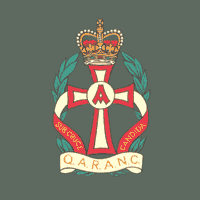Related Research Articles

The American Association of University Women (AAUW), officially founded in 1881, is a non-profit organization that advances equity for women and girls through advocacy, education, and research. The organization has a nationwide network of 170,000 members and supporters, 1,000 local branches, and 800 college and university partners. Its headquarters are in Washington, D.C. AAUW's CEO is Gloria L. Blackwell.
AFI's 100 Years...100 Stars is the American Film Institute's list ranking the top 25 male and 25 female greatest screen legends of American film history and is the second list of the AFI 100 Years... series.

Queen Alexandra's Royal Army Nursing Corps was the nursing branch of the British Army Medical Services.

Christine Ladd-Franklin was an American psychologist, logician, and mathematician.

Margaret Eliza Maltby was an American physicist notable for her measurement of high electrolytic resistances and the conductivity of very dilute solutions. Maltby was the first woman to earn a Bachelor of Science degree from the Massachusetts Institute of Technology, and the first woman to earn a Ph.D. in physics from any German university.
Marie Gertrude Rand Ferree was an American research scientist who is known for her extensive body of work about color perception. Her work included "mapping the retina for its perceptional abilities", "developing new instruments and lamps for ophthalmologists", and "detection and measurement of color blindness". Rand, with LeGrand H. Hardy and M. Catherine Rittler, developed the HRR pseudoisochromatic color test.
Ethel (Nicholson) Browne Harvey was an American embryologist, known for her critical findings about cell division, using the embryology of sea urchins, and for early work studying embryonic cell cleavage.
Hope Hibbard was an American biologist, cytologist, zoologist, and professor of zoology. Born in Altoona, Pennsylvania, she conducted research in the fields of histology and marine biology, utilizing organisms such as silkworms, limpets, earthworms, and frogs. Hibbard dedicated most of her life to education as a professor at multiple institutions, including Bryn Mawr College, Elmira College, and Oberlin College. She received accolades for her research and academic merits, such as the Sarah Berliner Research Fellowship and the Adelia A. Field Johnston Professor of Zoology. Hibbard is not only remembered for her intellectual endeavors, but for her support of women in the scientific sphere and her involvement in associations that forwarded female roles in science and research, such as the American Association of University Women (AAUW).

Dr. Caroline M. McGill (1879–1959) was a co-founder of the Museum of the Rockies in Bozeman, Montana, the first pathologist for the state of Montana and the first successful female doctor in Butte, Montana.
Notable American Women, 1607–1950: A Biographical Dictionary is a three-volume biographical dictionary published in 1971. Its origins lay in 1957 when Radcliffe College librarians, archivists, and professors began researching the need for a version of the Dictionary of American Biography dedicated solely to women.
Janet Howell Clark was an American physiologist and biophysicist.

Olga Hartman was an American invertebrate zoologist and polychaetologist. She was a student of S. F. Light at the University of California, Berkeley, and later a staff researcher at the Allan Hancock Foundation and professor of biology at the University of Southern California. Active from the 1930s to the 1970s, Hartman specialized in Polychaeta, a class of marine annelid worms, and was known for her work as a cataloger and as a polychaete systematist. She is considered one of the top three most prolific authors in her field, having described 473 polychaete species during her lifetime.
Edna Carter was an American Physicist born in High Cliff, Wisconsin and was born on January 28, 1872, and passed away on May 14, 1963, at the age of 91. Carter graduated from Vassar College in Poughkeepsie, New York in 1894. Carter was known for her contributions to X-ray research. Carter’s work on the properties of X-rays laid the foundations for Max von Laue's discovery of the wave-like properties of X-rays, for which he won the Nobel Prize in 1914.
References
- ↑ "The Sarah Berliner Research Fellowship for Women". Science. 28 (728): 832. 1908. Bibcode:1908Sci....28Q.832.. doi:10.1126/science.28.728.832. JSTOR 1635663. PMID 17810786.
- ↑ Elinson, Richard P. (31 May 2018). "Women's Prize: Be More Generous". Nature. 557: 637.
- ↑ Ladd-Franklin, Christine (24 November 1911). "The Sarah Berliner Fellowship". Science: 705–706.
- 1 2 3 4 5 6 Rossiter, Margaret (1982). Women Scientists in America: Struggles and Strategies to 1940. The Johns Hopkins University Press. pp. 49–50.
- ↑ Office of Public Relations, University of Rochester (May 1970). "Janet Howell Clark (1889–1969)". Radiation Research. 42 (2): 424–425. JSTOR 3572809.
- ↑ Browne, Ethel Nicholson (1916). "A comparative study of the chromosomes of six species of notonecta". Journal of Morphology. 27 (1): 119–161.
- ↑ "A.A.U.W. Awards Seven Fellowships". Top O' The World – WCU. No. 13, no. 7. February 27, 1934. Retrieved 2021-12-07.
- 1 2 3 "Dr. Lewis of Physics Dept. Given High AAUW Honor". Vassar Miscellany News. No. XII, no. 3. 12 February 1938. Retrieved 2021-12-07.
- ↑ Hartman, Olga (September 1983) [1939]. "Travels with Olga". SCAMIT Newsletter. Southern California Association of Marine Invertebrate Taxonomists. 2 (6): 3.